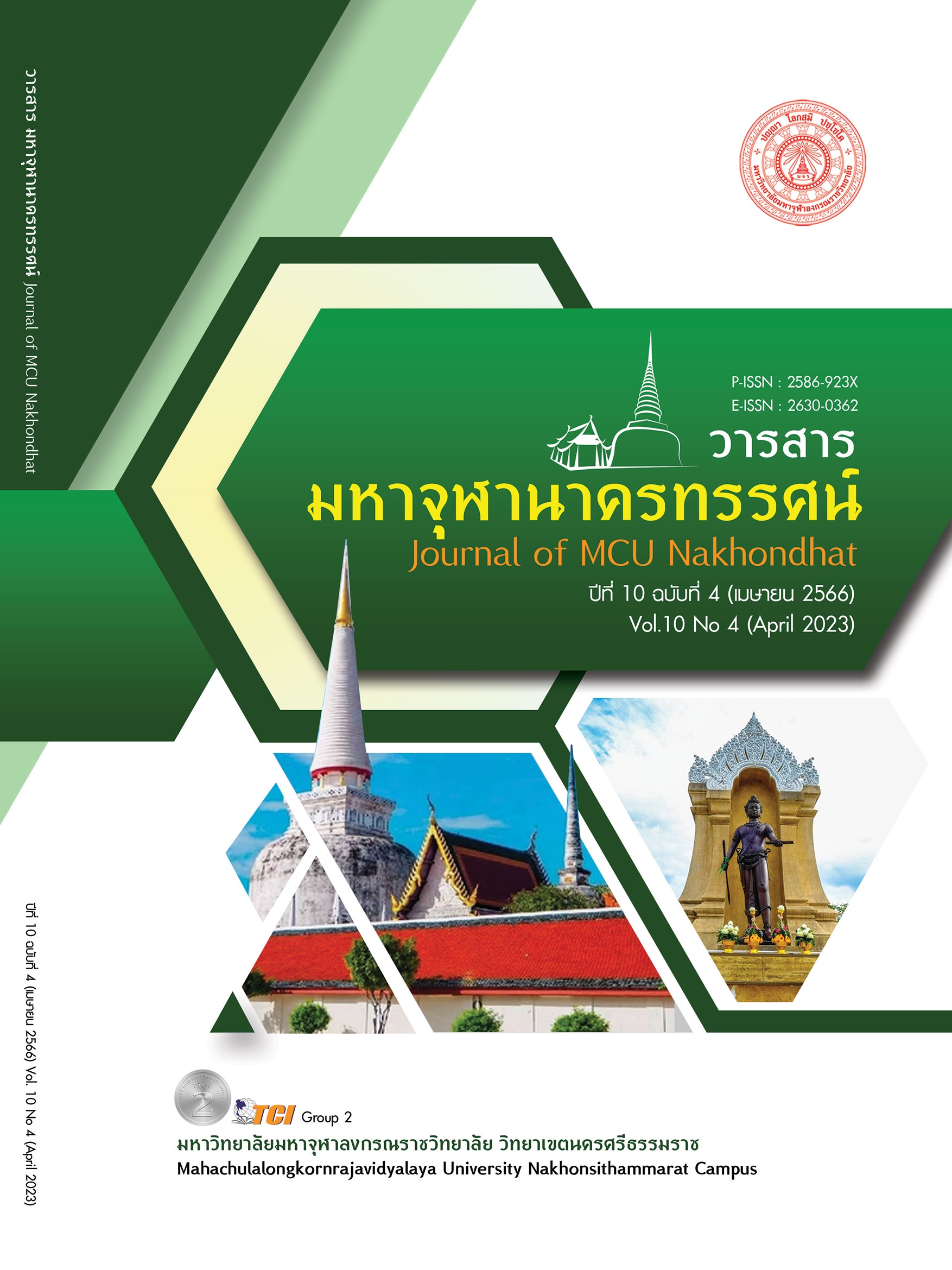CAUSAL FACTORS AFFECTING EFFECTIVENESS OF SMALL ELEMENTARY SCHOOLS IN NORTHEAST
Main Article Content
Abstract
The purposes of this research were 1) to study the causal factors of small elementary school effectiveness in the northeastern region. 2) to examine the linear structural relationship model of the causal factors of small elementary school effectiveness in the northeastern region. 3) to study the approach to develop causal factors of the effectiveness of small elementary schools in the northeastern region. The results showed that the level of causal factors of overall school effectiveness was at a high level as follows: Organizational culture has an average of 4.54, in the highest level. Leadership of executives had an average of 4.49, in a high level. The school environment had an average of 4.49, in a high level. Teaching management had an average of 4.49, in a high level. The causal relationship model of school effectiveness was consistent with the empirical data. with Chi-Square (χ2) = 54.41, Degrees of Freedom (df) = 26, Chi-Square/Degrees of Freedom (χ2/df) = 2.09, Probability Value (p-value) = 0.0009, Root Mean Square Error of Approximation (RMSEA) = 0.039,Goodness of Fit Index (GFI) = 0.99, Adjusted Goodness of Fit Index (AGFI) = 0.95, Critical N (CN) = 597.76, Comparative Fit Index (CFI) = 1.00, Root Mean Square Residual (RMR) = 0.005. Guidelineson developing causal factors of school effectiveness. Executive leadership executives should have vision, knowledge, skills and good personality as role models. School environment it should be clean and shady to be a source of learning. organizational culture trusts mutual acceptance, friendship with each other teaching management teachers should organize activities for learners to practice in order to develop skills to encourage learners to learn.
Article Details

This work is licensed under a Creative Commons Attribution-NonCommercial-NoDerivatives 4.0 International License.
References
กฎกระทรวงการประกันคุณภาพการศึกษา . (2561). ราชกิจจานุเบกษา เล่ม 135 ตอนที่ 11 ก หน้า 3 (23 กุมภาพันธ์ 2561).
ธัญชนก ยอดสวัสดิ์. (2561). องค์ประกอบและตัวบ่งชี้ที่เพิ่มประสิทธิผลในการบริหารสถานศึกษาระดับประถมศึกษาสังกัดสำนักงานคณะกรรมการการศึกษาขั้นพื้นฐานเขตพื้นที่ภาคใต้ชายฝั่งตะวันตก. ใน ดุษฎีนิพนธ์ศึกษาศาสตรดุษฎีบัณฑิต สาขาวิชาการบริหารการศึกษา. มหาวิทยาลัยหาดใหญ่.
ปาริชาติ เภสัชชา. (2558). การพัฒนาสมรรถนะครูผู้นำด้านการใช้เทคโนโลยีสารสนเทศและการสื่อสารในการจัดกิจกรรมการเรียนรู้ศตวรรษที่ 21. วารสารบัณฑิตศึกษา, 12(59), 95-104.
พระมหายุทธนา ตุ้มอ่อน. (2564). รูปแบบการพัฒนาสมรรถนะการบริหารงานวิชาการของผู้บริหาร โรงเรียนพระปริยัติธรรมแผนกสามัญศึกษาในภาคตะวันออกเฉียงเหนือ. ใน ดุษฎีนิพนธ์ปรัชญาดุษฎีบัณฑิต สาขาการบริหารและพัฒนาการศึกษา. มหาวิทยาลัยราชภัฏสกลนคร.
ลออง วัจนะสาริกากุล. (2557). การพัฒนารูปแบบความสัมพันธ์เชิงสาเหตุของปัจจัยที่มีอิทธิพลต่อการเป็นองค์การแห่งการเรียนรู้ของสถานศึกษา สังกัดสำนักงานคณะกรรมการการอาชีวศึกษา. ใน วิทยานิพนธ์ครุศาสตรดุษฎีบัณฑิต สาขาวิชาการบริหารการศึกษา. มหาวิทยาลัยราชภัฏวไลยอลงกรณ์.
สำนักงานคณะกรรมการการศึกษาขั้นพื้นฐาน. (2554). แนวทางการพัฒนาระบบการประกันคุณภาพภายในของสถานศึกษา ตามกฎกระทรวงว่าด้วยระบบหลักเกณฑ์และวิธีการประกันคุณภาพการศึกษา พ.ศ.2553. กรุงเทพมหานคร: สำนักงานคณะกรรมการการศึกษาขั้นพื้นฐาน.
สำนักงานคณะกรรมการการศึกษาขั้นพื้นฐาน. (2562). นโยบายสำนักงานคณะกรรมการการศึกษาขั้นพื้นฐานปีงบประมาณ พ.ศ. 2563. กรุงเทพมหานคร: โรงพิมพ์ชุมนุมสหกรณ์การเกษตรแห่งประเทศไทย จำกัด.
สำนักงานเลขาธิการสภาการศึกษา. (2563). สมรรถนะการศึกษาในเวทีโลก ปี 2562 (IMD 2019). กรุงเทพมหานคร: บริษัท 21 เซ็นจูรี่ จำกัด.
อิทธิพล พลเหี้ยมหาญ. (2562). การพัฒนารูปแบบการบริหารโรงเรียนมัธยมศึกษาขนาดเล็กที่มีประสิทธิผลสังกัดสำนักงานเขตพื้นที่การศึกษามัธยมศึกษา ในภาคตะวันออกเฉียงเหนือ. ใน ดุษฎีนิพนธ์ปรัชญาดุษฎีบัณฑิต สาขาวิชาการบริหารและพัฒนาการศึกษา. มหาวิทยาลัยราชภัฏสกลนคร.
Bass, B.M., & B.J. Avolio. (1999). Transformational Leadership Development. Pola Alto, California: Consulting Psychologists Press.
Davis Keith, & John, Newstrom W. (1989). Human Behavior at Work. (8thed.). New York: McGraw-Hill.
Hoy, Wayne K, and Miskek, Cecil. G. (2001). Educational administration: Theory research and practice (6thed.) . New York: McGraw-Hill.
Sergiovanni, et al. (2001). The Principalship: A Reflective Practice Perspective. (4thed.). Boston: Allyn & Bacon.


